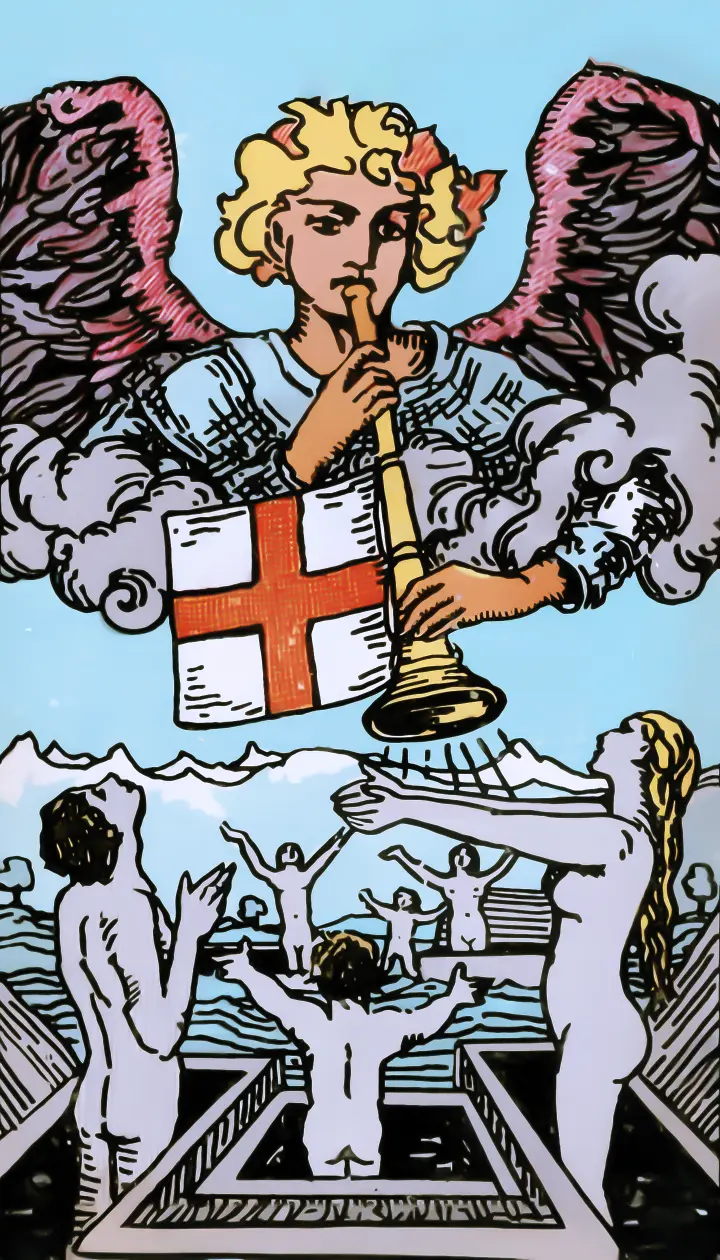
The Judgment Card Fully Explained
By DivinationToolThe Judgment card marks a moment of awakening, inner reckoning, and transformation. This article explores the upright and reversed meanings of the Judgment card, revealing its deep ties to rebirth, resolution, and spiritual calling.
The Judgment Card Fully Explained | Awakening, Redemption, and Spiritual Calling
Associated Information
Related Keywords: The meaning of death and rebirth Corresponding Astrological Body: Pluto Element: Fire
Key Words
Cyclical, testing, judgmental, a new cycle, awakening, renewal, rebirth, spiritual transcendence, evaluation, significant change, major transformation, the beginning of a new era.
Upright Interpretation
Rebirth after death, readjusting one's mindset and starting over, inner awakening, renewal of beliefs, liberation from constraints, satisfying results, the end of suffering, gaining new inspiration through re-examination of the past, a new beginning, a new relationship.
Reversed Interpretation
Unjust judgment, unable to pass tests, repetition of old issues, stubbornness and unwillingness to change, self-righteousness, narrow views on life, deep regret, self-blame, unsatisfactory outcomes, being crushed.
A reversed Judgment card indicates that the querent may be unwilling to examine their inner self or reflect deeply. Things cannot be undone, and no new progress is being made. The past actions are affecting current developments because past mistakes were never properly reviewed or corrected. For example, if a couple reconciles after a breakup caused by quarrels, they might fall into the same conflict patterns again. It may also imply that the challenge of reflection is too overwhelming to overcome.
In some cases, the querent may refuse to admit guilt or accept themselves. A common example is trying to dilute one's guilt through collective blame: such as someone who had an affair and defends it by saying, "All men make this mistake, it's a common impulse," or even suggesting, "If I were someone else, I'd have done the same." This is shifting responsibility to others, refusing to take ownership of one's actions. Or they may internalize external judgments and standards—defining themselves based on others’ rules and measures of success or failure—thus blinding themselves to their own inner ideals and callings.
Regarding health, a reversed Judgment card may signal the recurrence of a past illness (a disease 'reborn'), so attention should be paid to any signs of relapse.
In the reversed Judgment card, we are told that when a person has not touched their own true self, it leads to struggle and confusion. The inner calling has always been there but fails to stir the soul. Such individuals often live in a state of conflict. On the other hand, the judgment process is painful—the past stands clearly before us, and we must take full responsibility for it, including compensating for what was missed and owning up to a life not lived authentically. Judgment signifies that matters have ended; facts are set and unchangeable. Time lost cannot return. What we can do is make up for the past through future efforts—by doing our best to heal what was broken.
Detailed Meaning of the Card
When the "Judgment" card appears, it signifies that the time of reckoning has come—what is right or wrong, success or failure, all must now be concluded.
The angel in the "Judgment" card acts as the adjudicator. He is impartial and desireless; his judgment is entirely based on the mindset and actions of those being judged. Those who have long avoided confrontation, those silenced by past failures—now awaken and await the angel's verdict. What must be repaid or paid for will return in the form of karmic cycles, demanding to be faced again. Those who are entirely guiltless are given the chance for a fresh start. This is a fair test; no one can escape Judgment by chance. Maintaining a clear head is the best way to face this moment.
The scene portrayed is the Judgment Day—deep introspection and atonement after the end of all things. This card is the final phase before completion: through a stage-wise test, life is reborn into a new phase, allowing for self-elevation and a second chance at life. The past has ended, and a new beginning is arriving. The most important task at this stage is recognizing one's faults, acknowledging one's guilt, and accepting the self.
Judgment is about deeply reflecting on oneself and discovering new value within. The coffin represents the external rules, moral judgments, and value standards we rely on, while the angel’s trumpet signifies the voice from within. At this moment, people rise from the coffin to receive the angel’s blessing—symbolizing the shift from external evaluation to listening to the inner voice. Here, it also shows that moral conscience must arise from within, not merely be dictated by legal norms. This isn’t about rejecting traditional doctrines or laws, which help us function in society; rather, it’s about tuning into our inner voice and climbing out of the coffin—rediscovering, recognizing, and becoming our true selves. Judgment speaks of breaking free from worldly constraints and entering a state of inner freedom.
In relationships, both parties may be entering a new phase—a transitional moment. For example, after a breakup or argument, the Judgment card suggests there may be another chance. If fate is grasped well, the upright Judgment often points to reconciliation, where the couple can face each other more tenderly and deepen their connection through past experiences. In interpersonal or professional matters, obstacles may arise, prompting a need for self-examination, self-evaluation, and identifying aspects of relationships or behaviors that need adjustment.
Both the Death and Judgment cards imply rebirth, but they differ in nature: The Death card reveals what we are not—a process of elimination and rejection. The Judgment card reveals what we are—through embracing the inner self, we become our true selves. Thus, they offer different methods and processes for self-discovery.